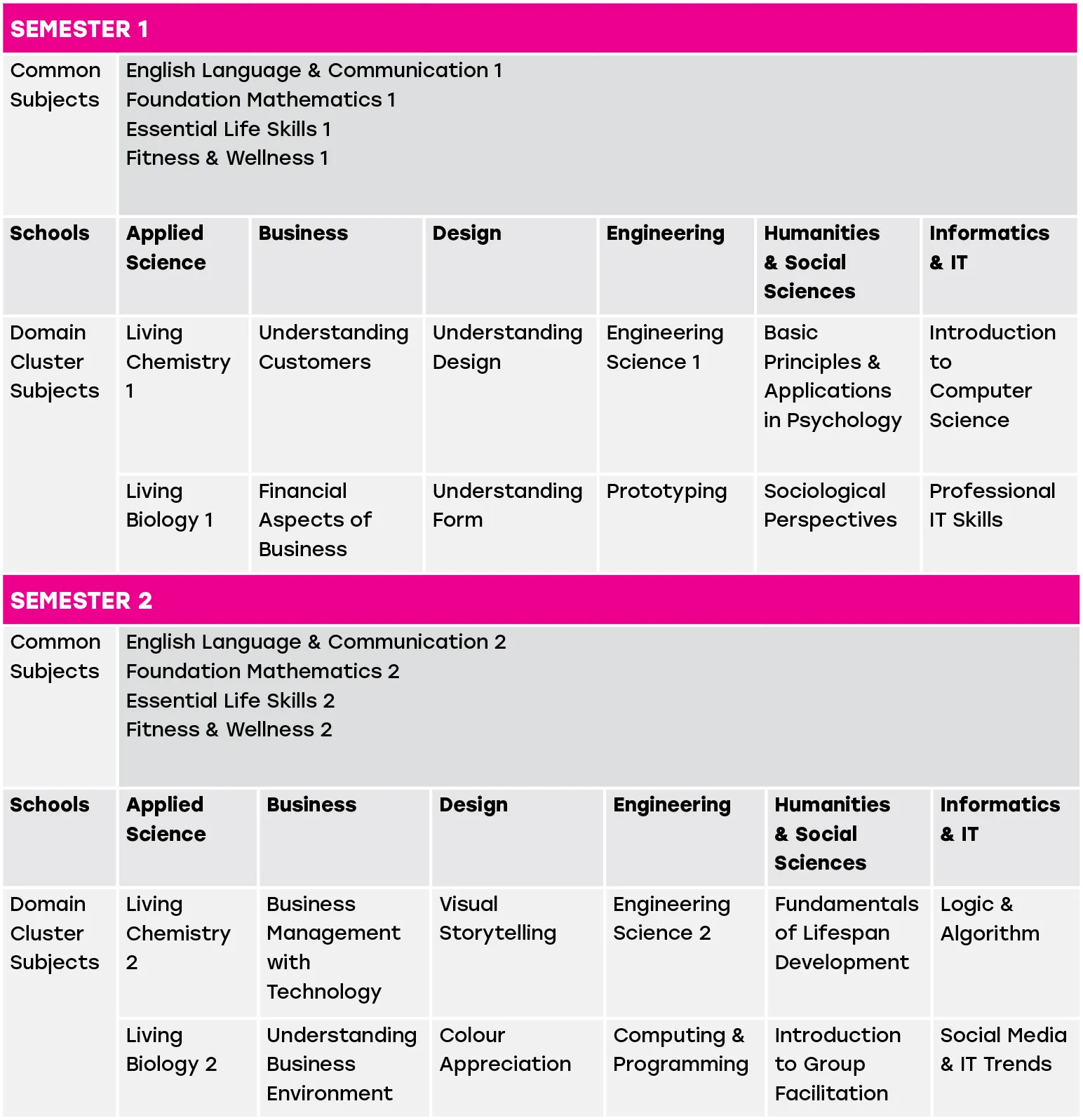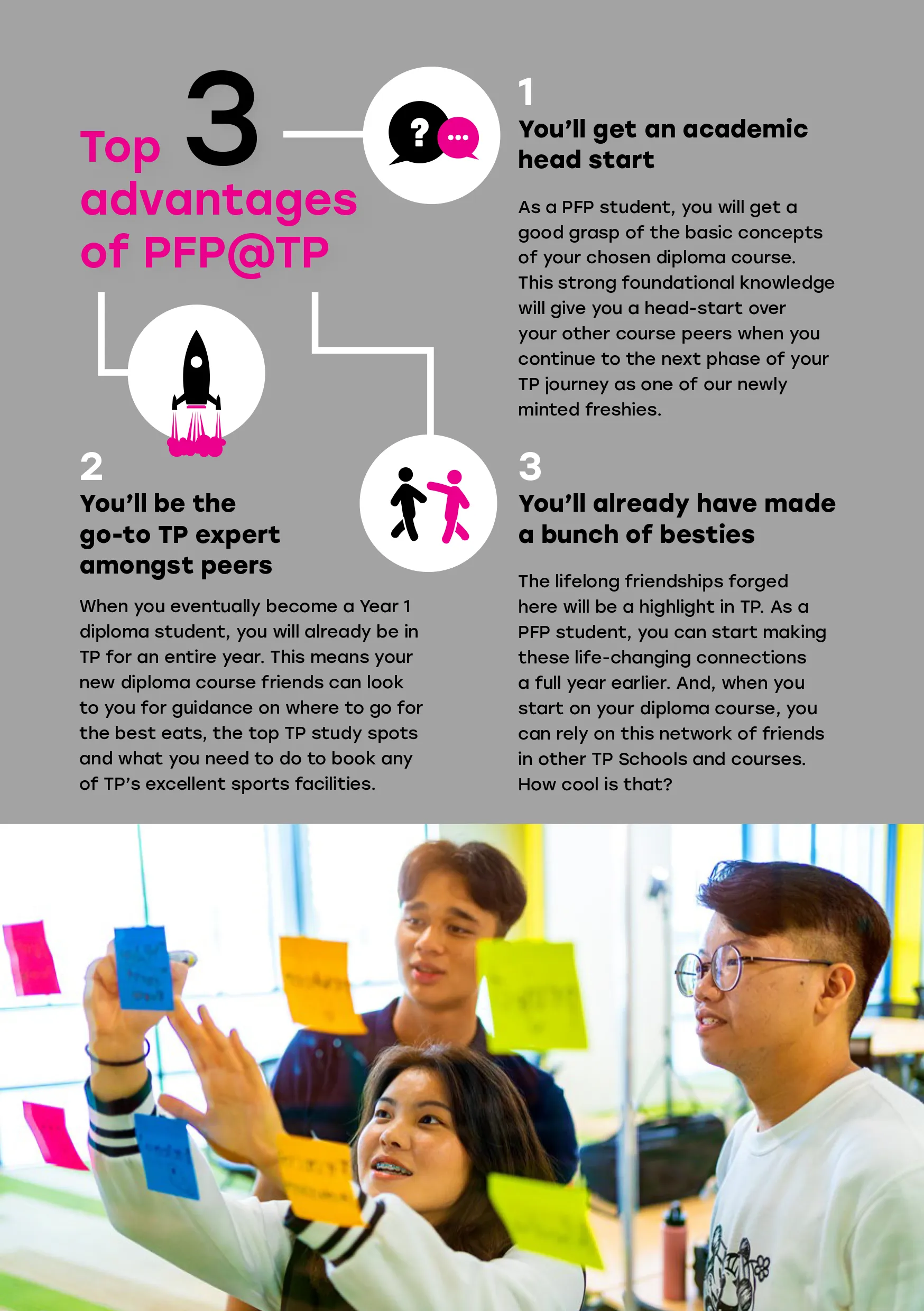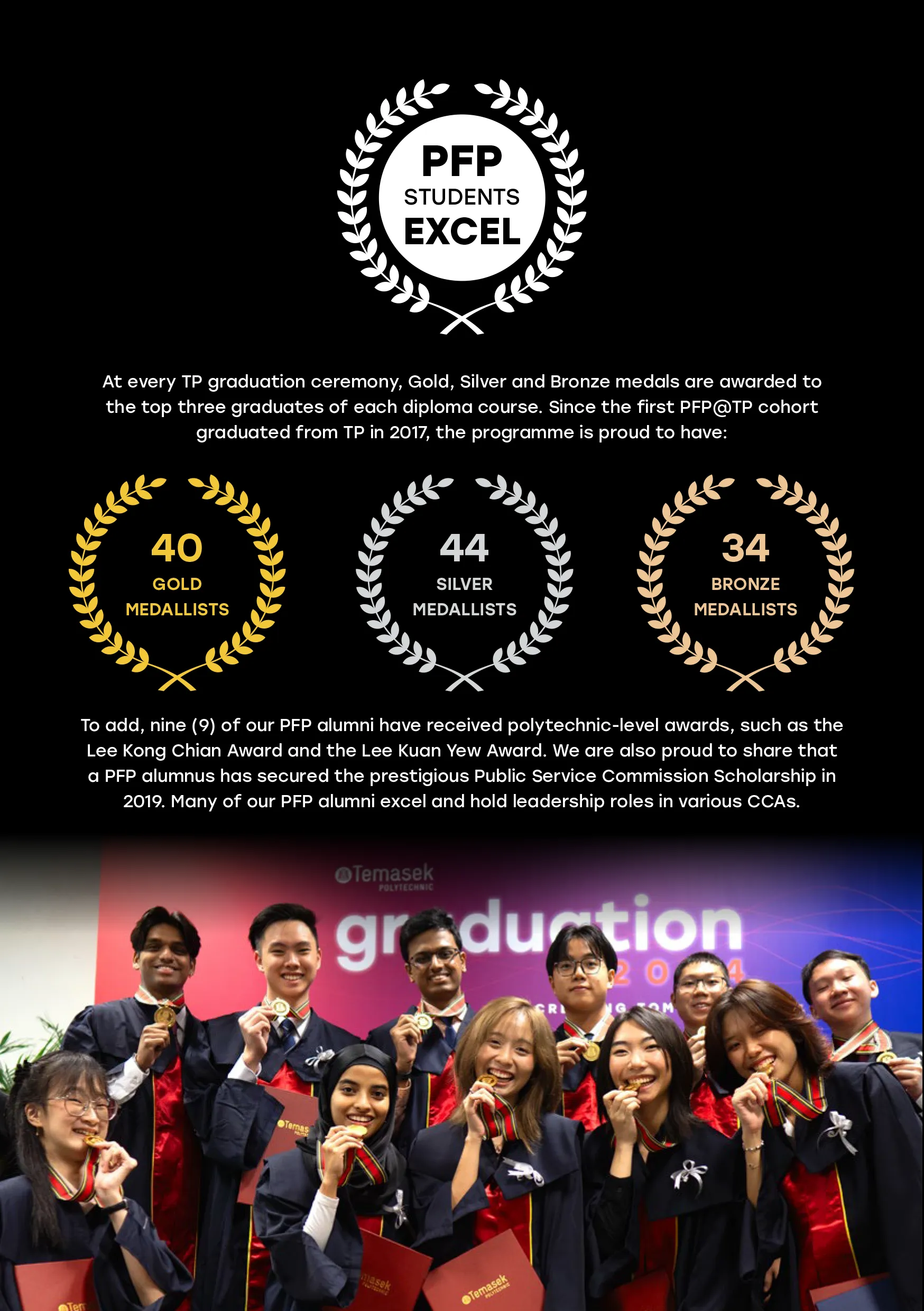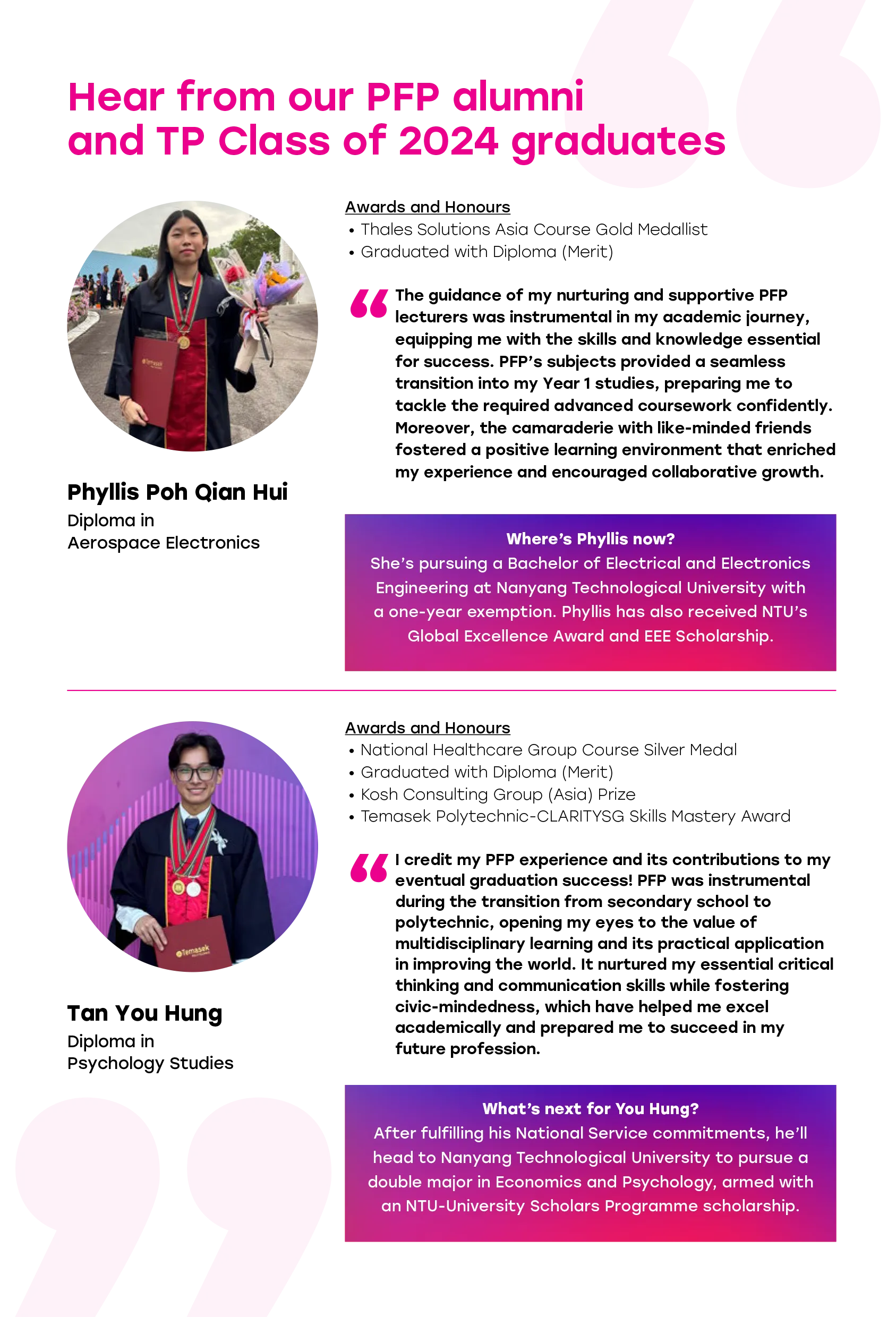Course Overview
The Polytechnic Foundation Programme (PFP@TP) is a one-year programme provided by the Centre for Foundation Studies to provide a head start for the top Secondary 4 Normal (Academic) students at the Singapore-Cambridge GCE N(A) Level Examinations in Temasek Polytechnic. Instead of taking the GCE O Level Examinations in Secondary 5, eligible students can join PFP@TP before admission to their pre-selected diploma courses.
The PFP curriculum consists of four
Common Subjects and two Domain Cluster Subjects each semester. PFP students go through a modular credit system, where credit units are awarded for every subject they complete.
The PFP curriculum follows Temasek Polytechnic’s academic calendar, which runs in two semesters. Lessons are conducted in small groups.
View the brochure for essential information about the programme:
Entry Requirements
Secondary 4 N(A) students who are eligible for the PFP will be invited to apply through the Polytechnic Foundation Programme Admission Exercise (PFPAE) in January.
They should first progress to Secondary 5 before the commencement of the application process.
Eligible N(A) students who have done well for Singapore-Cambridge GCE N(A) Level examination will be invited to apply for the Polytechnic Diploma courses of their choice under PFP.
To be eligible to apply for the PFP, N(A) students must:
- Obtain ELMAB3 (English Language, Mathematics, Best 3 subjects) raw aggregate score of 12 points or better (excluding CCA bonus point) at the GCE N(A) Level examination; and
- Meet the following subject-specific requirements:
Please note that the information on this website is applicable to the programme for AY2025/2026 admission year.
| For Courses featured in Group 1 | Minimum Required Grades |
|---|---|
| English Language Syllabus A | 3 |
| Mathematics (Syllabus A / Additional) | 3 |
One of the following relevant subjects:
|
3 |
| Any two other subjects excluding CCA | 4 |
| For Courses featured in Group 2 | Minimum Required Grades |
|---|---|
| English Language Syllabus A | 2 |
| Mathematics (Syllabus A / Additional) | 3 |
One of the following relevant subjects:
|
3 |
| Any two other subjects excluding CCA | 4 |
Below is an example of how aggregate score is computed:
| Subjects | Grades |
|---|---|
| English Language Syllabus A | 2 |
| Mathematics (Syllabus A / Additional) | 3 |
Science (Physics, Chemistry) |
1 |
Humanities (Social Studies, Geography) Humanities (Social Studies, History) Humanities (Social Studies, Literature in English) |
2 |
| Mother Tongue | 2 |
Raw ELMAB3 Aggregate: 2+3+1+2+2 = 10
For N(A) students who have sat for certain subject(s) in the GCE O Level examination, the following conversion matrix will be adopted during the computation of aggregate.
| GCE O Level Grade | Aggregate Point for PFP |
|---|---|
| A1 - B3 | 1 |
| B4 - C6 | 2 |
| D7 | 3 |
| E8 | 4 |
PFP@TP offers a practice-oriented curriculum specially designed to:
- Lay a strong foundation through applied and group-based learning
- Provide students a foretaste of chosen diplomas
- Enable an encouraging and nurturing transition to tertiary education
- Develop self-directedness in learning and desired real-world competencies
You will take four Common Subjects and two Domain Subjects each semester.
- English Language & Communication 1
This subject examines a variety of written and spoken texts, from both print and non-print sources, relating to reading, listening, speaking and writing. The subject also covers skills for interpreting and expressing messages in diverse modalities. It builds the language foundation for effective communication for their diploma studies.
- Foundation Mathematics 1
This subject covers foundational mathematical concepts that are applicable to real-world for a wide range of applications, particularly in the different clusters.
For Business, Design and Humanities clusters, topics covered include algebraic manipulation, functions and graphs, trigonometry, and statistics.
For Engineering, Science and Technology clusters, topics covered include algebraic manipulation, functions and graphs, trigonometry, and differentiation.
- Essential Life Skills 1
This subject cultivates abilities in maintaining personal effectiveness and covers the impact of social awareness on interpersonal relationships. It also covers effective collaboration and communication through teamwork. The subject will also look into the capacity to identify interests, aptitudes, and strengths, and exploration of various career sectors via education and career guidance to shape a career self-concept and make informed decisions.




Course Fees
For more information on course fees, please click here.
Contact
Contact Details for Admission & Application Enquiries:
Tel: 67802000
Email: admissions@tp.edu.sg
- cfs@tp.edu.sg
- 67804220
- 8.30 am to 6.00 pm (Mon to Thu) 8.30 am to 5.30 pm (Fri) Closed on Sat, Sun & Public Holidays
- Website: https://www.tp.edu.sg/centre-for-foundation-studies
-
Centre for Foundation Studies
Temasek Polytechnic
Block 13, Level 3, Unit 81, (Near Lift Lobby E)
21 Tampines Ave 1
Singapore 529757
Temasek Polytechnic reserves the right to alter the course, modify the scale of fee, amend any other information or cancel course with low enrolment.
Please note that the information on this website is applicable to the programme for AY2025 and AY2026 admission years.




